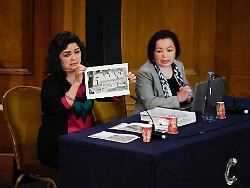Friday 4th June 2021
Torture and rape
Statements by Uyghurs weigh heavily on China
The “Uyghur Tribunal” in London wants to find out more about the situation of the Muslim minority in the Chinese province of Xinjiang. Witnesses report torture, mass rape and forced sterilization. Beijing defends itself against the allegations and imposes sanctions on those involved.
In London, an independent body has started hearing Uyghurs accusing China of serious mistreatment of members of the Muslim minority. Witnesses reported to the Uyghur Tribunal about gang rape and forced sterilization of women in Beijing-run camps in northwest China’s Xinjiang Province. The body, made up of lawyers and human rights experts, plans to publish a report on the human rights situation in Xinjiang in December. Beijing spoke of slander.
“The allegations against the People’s Republic of China are grave,” said panel chairman Geoffrey Nice at the opening of the meeting. The tribunal is not affiliated with any government, but was set up at the request of the largest Uyghur exiled organization, the World Uyghur Congress. China refused to attend and imposed sanctions on those involved.
Qelbinur Sidik, a Muslim teacher with Uzbek roots from Xinjiang’s capital Urumqi, reported on her stay in two stinking, overcrowded “re-education” camps for Uyghurs where she was forced to teach Chinese. People had to wear shackles during the hours of class, she told the tribunal. The guards in the camp did not see the male prisoners as “human beings,” said Sidik. “They enjoyed watching them be humiliated. Their suffering was their joy to them.”
Witness: Tortured for four days and nights
Sidik said that female prisoners were ill-treated when brought for interrogation. “They were not only tortured but raped, sometimes in groups,” she added. Forced sterilization of Uighur women was common and in one case a female prisoner died as a result. She was also forcibly sterilized before she was granted a visa to visit her daughter in the Netherlands and flee China. “I don’t want anyone to suffer like that,” said Sidik through tears.
Omir Bekali, a Kazakh citizen of Uighur descent, also spoke to the panel. Bekali says he was arrested while visiting his family in Xinjiang. At one point in his testimony, he put on shackles to show the panel how he had been held in a camp for over seven months. “I was tortured for the first four days and nights,” he said. “I was hung from the ceiling.” Then he was beaten all over the body and on the soles of the feet. His father was killed and his brother was disabled after being tortured.
According to human rights organizations, at least one million members of the Uyghurs and other Muslim minorities are detained in detention camps in Xinjiang. There they are reportedly being forced to give up their religion, culture and language, and in some cases also mistreated. Washington accuses Beijing of genocide of the Uyghurs and other minorities in Xinjiang. Beijing rejects the allegations and speaks of training and work programs against extremism.
.
